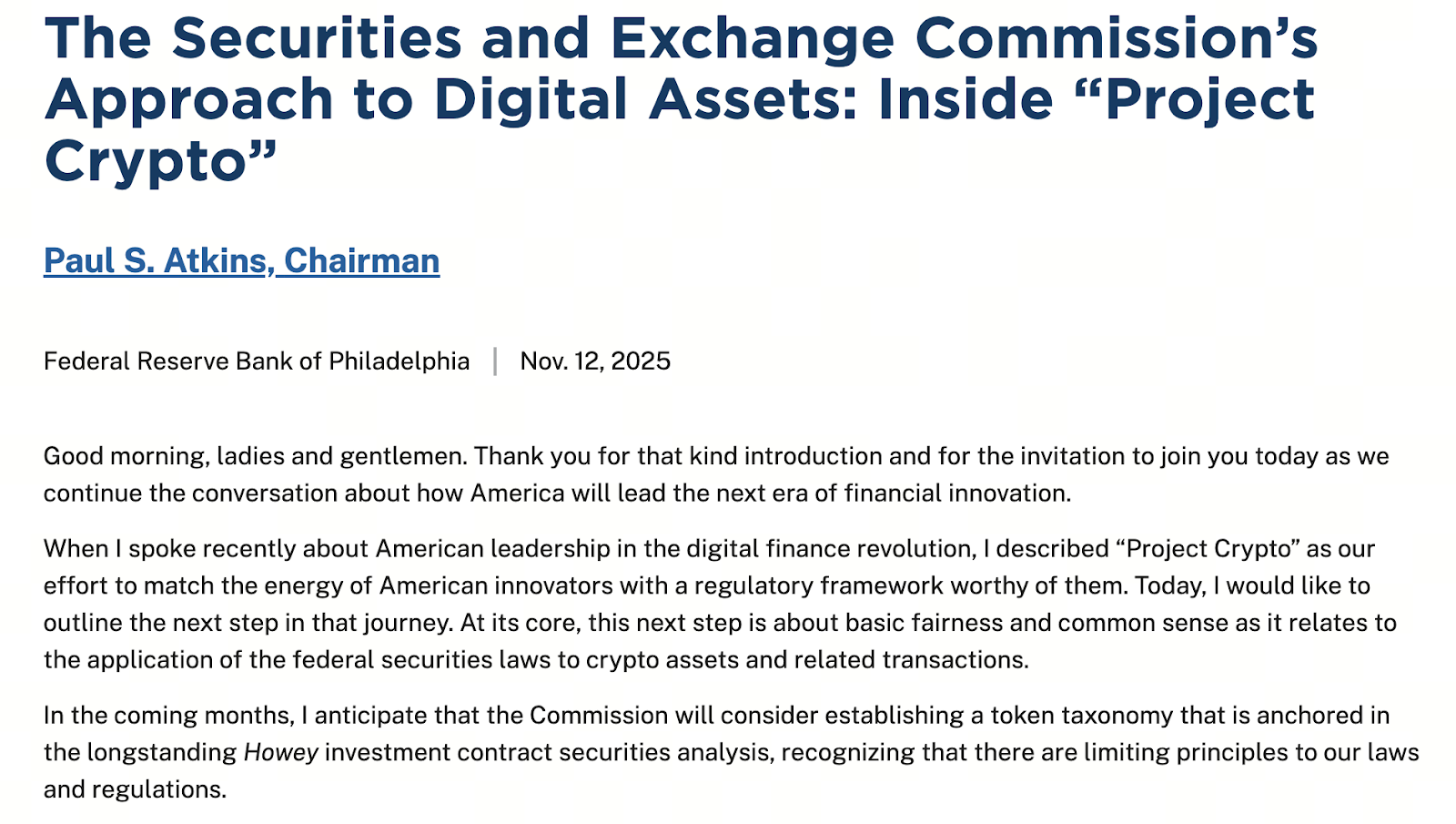SEC Chair Clarifies Crypto Asset Categories: NFTs, Network Tokens, and Digital Tools Are Not
SEC Chairman Outlines Clear Regulatory Classification Framework

(Source: SEC / Paul S. Atkins, Chairman)
The Chairman of the U.S. Securities and Exchange Commission (SEC) recently delivered a landmark address, clarifying that not all crypto assets should be classified as securities. Specifically, NFTs (Non-Fungible Tokens), Network Tokens, and Digital Tools are characterized by utility and functional value rather than investment characteristics. This announcement signals a significant shift in the SEC’s regulatory stance toward Web3 and the broader crypto industry, aiming to establish a foundation that supports both innovation and compliance.
SEC Introduces Token Classification Framework
During his remarks, the Chairman emphasized that the SEC is developing a definitive token classification framework centered on the established Howey Test to re-evaluate which crypto assets fall under securities regulation. He noted that, for years, the market has operated under the misconception that any token issued as part of an investment contract is permanently deemed a security.
This viewpoint contradicts established legal principles and impedes market innovation. The Chairman underscored, “An investment contract is a relationship, not a label. Once that relationship concludes, the asset itself should no longer be considered a security.”
Four Primary Categories of Crypto Assets
Under the Chairman’s proposed framework, crypto assets are broadly divided into four categories:
- Digital Commodities / Network Tokens
These tokens are integral to blockchain system operations, deriving value from the decentralized network itself rather than managerial efforts, and thus are excluded from securities classification. - Digital Collectibles
Assets such as artwork, music, and gaming items possess cultural or entertainment value. Buyers do not expect investment returns, so these are not considered securities. - Digital Tools
Examples include memberships, tickets, credentials, or identity verifications—utility tokens designed for functional use rather than investment purposes. - Tokenized Securities
These represent traditional financial instruments (like stocks or bonds) represented on the blockchain, remaining subject to securities law oversight.
This classification aims to eliminate regulatory ambiguity, enabling innovators and investors to operate within a transparent legal environment.
A New Take on the Howey Test
The SEC Chairman stressed that investment contracts are not perpetual. As projects mature, code is completed, and governance is decentralized, market reliance on the issuer naturally diminishes. This ends the original investment relationship. At this point, tokens should lose their securities status.
He referenced the Howey case: once the Florida orange grove investment plan concluded, the land itself ceased to be part of the investment contract; likewise, when a blockchain project achieves decentralization, its tokens should no longer be treated as securities. The market has widely accepted this perspective, viewing it as an encouraging signal from the SEC to the crypto sector.
Clear Rules Foster Innovation
The SEC Chairman also stated that regulation is not intended to stifle innovation but to establish predictable, actionable guidelines. Moving forward, the SEC will advance a series of exemptions and support measures. This will allow developers to issue tokens within a well-defined regulatory framework, rather than dealing with regulatory uncertainty.
This reform enables innovators to concentrate on technology and products instead of dealing with regulatory uncertainty. The Chairman emphasized, “Our objective is not to expand our jurisdiction, but to ensure capital formation can thrive while safeguarding investor interests.”
To learn more about Web3, click to register: https://www.gate.com/
Conclusion
The SEC Chairman’s remarks mark a pivotal shift in U.S. regulatory attitudes—from skepticism to understanding, and from vague oversight to clear categorization. The SEC no longer automatically classifies NFTs, Network Tokens, and Digital Tools as securities, which brings unprecedented clarity and confidence to the blockchain industry. Token economies and decentralized applications are evolving rapidly. Transparent regulation will drive innovation and support shared investment growth. As the Chairman stated, “Our mission is not to let the future remain bound to the past, but to ensure that freedom and innovation flourish under sound rules.”
Related Articles

Pi Coin Transaction Guide: How to Transfer to Gate.io

Flare Crypto Explained: What Is Flare Network and Why It Matters in 2025

How to Use a Crypto Whale Tracker: Top Tool Recommendation for 2025 to Follow Whale Moves

What is N2: An AI-Driven Layer 2 Solution

2025 BTC Price Prediction: BTC Trend Forecast Based on Technical and Macroeconomic Data
